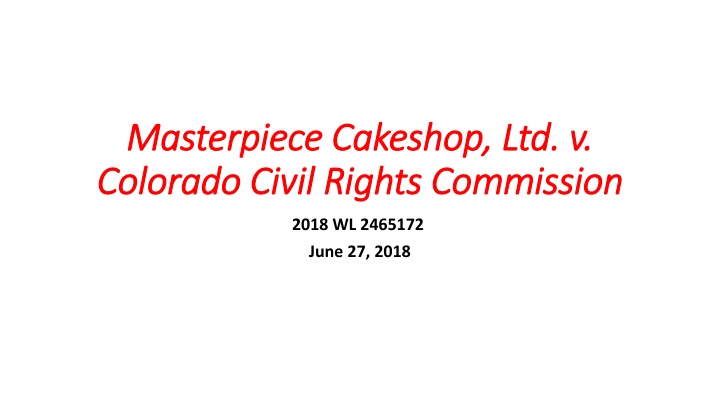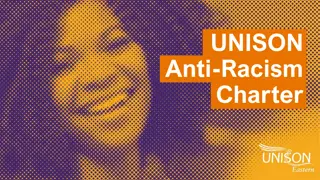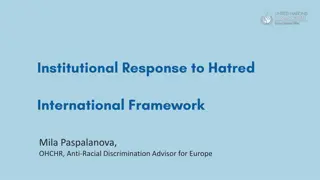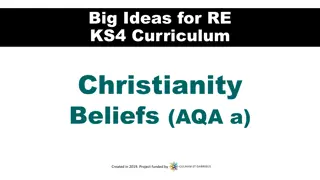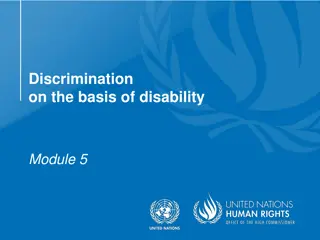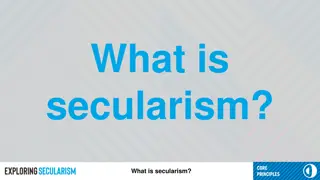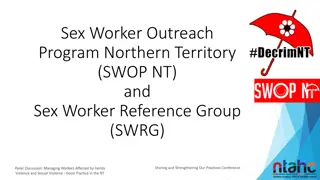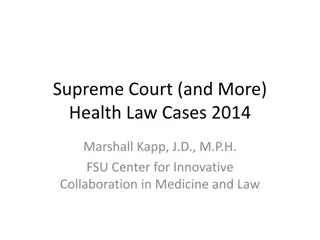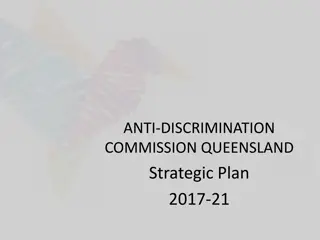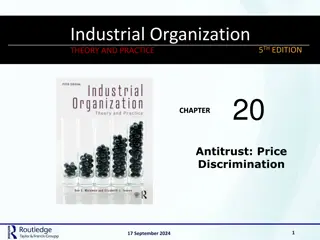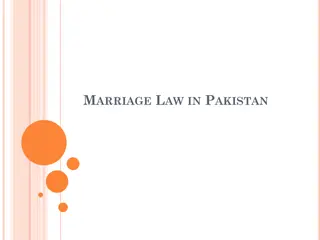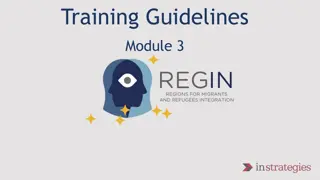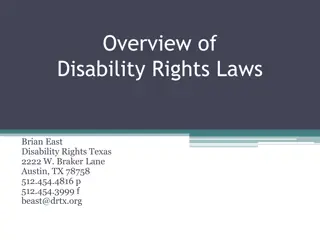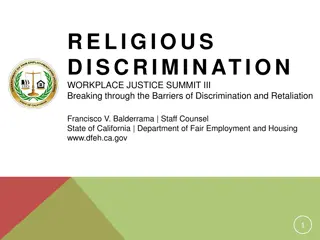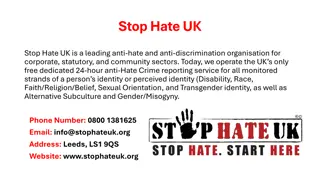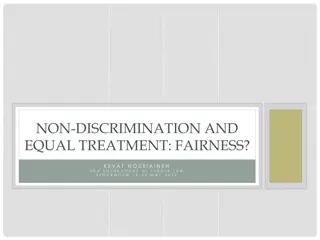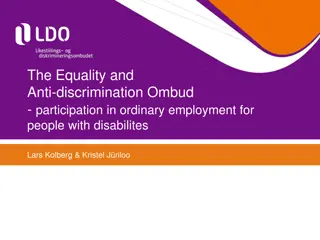Masterpiece Cakeshop Case: Religious Beliefs vs. Anti-Discrimination Laws
In the Masterpiece Cakeshop case, Jack Phillips, a devout Christian baker, refused to create a custom wedding cake for a same-sex couple due to his religious beliefs. This led to a legal battle addressing the clash between religious freedom and anti-discrimination laws. The case explores the complexities of balancing personal beliefs with public accommodation requirements.
Download Presentation

Please find below an Image/Link to download the presentation.
The content on the website is provided AS IS for your information and personal use only. It may not be sold, licensed, or shared on other websites without obtaining consent from the author.If you encounter any issues during the download, it is possible that the publisher has removed the file from their server.
You are allowed to download the files provided on this website for personal or commercial use, subject to the condition that they are used lawfully. All files are the property of their respective owners.
The content on the website is provided AS IS for your information and personal use only. It may not be sold, licensed, or shared on other websites without obtaining consent from the author.
E N D
Presentation Transcript
Masterpiece Cakeshop, Ltd. v. Masterpiece Cakeshop, Ltd. v. Colorado Civil Rights Commission Colorado Civil Rights Commission 2018 WL 2465172 June 27, 2018
From the Masterpiece Cakeshop Web Page Welcome! Jack Phillips creates a masterpiece. Custom designs are his specialty: If you can think it up, Jack can make it into a cake!
The Facts Masterpiece Cakeshop, Ltd., is a bakery located in a Denver suburb. It offers a variety of baked goods, including cookies, brownies, and elaborate cakes that are custom-designed for special events, including weddings and birthday parties. Jack Phillips has owned and operated the shop for 24 years. He is an expert baker. He is also a devout Christian. His main goal in life is to be obedient to Jesus Christ and Christ s teachings in all aspects of his life. He seeks to honor God through his work at the bakery. One of his religious beliefs is that it is God s intention for marriage from the beginning of history is that it is and should be the union of one man and one woman. For Jack Philips, creating a wedding cake for a same-sex wedding would be the same as participation in a celebration contrary to his deeply held religious beliefs.
Charlie Craig and Dave Mullins were planning on marrying in the summer of 2012. Colorado did not recognize same-sex marriage at the time, so Craig and Mullins planned on marrying legally in Massachusetts and to have a reception later in Colorado. Colorado did not recognize same-sex marriage at the time, and Obergefell v. Hodges was not decided until 2015. They visited the Masterpiece Cakeshop and told Phillips that they were interested in ordering a cake for their wedding. They did not mention what sort of cake design they had in mind.
Phillips told them that he does not create wedding cakes for same-sex weddings, . . . explaining that I ll make your birthday cakes, shower cakes, sell you cookies and brownies, I just don t make cakes for same sex weddings. The next day Craig s mother, who was with Craig and Mullins the previous day, phoned Phillips to ask why he declined to design a cake for her son. He explained that it was because of his religious opposition to same-sex marriage, and also because same-sex marriage was not recognized in Colorado at the time. Phillips explained later that is his belief that creating a wedding cake for an event that celebrates something that directly goes against the teachings of the Bible, would have been a personal endorsement and participation in the ceremony and relationship that they were entering into. The parties disagreed as to whether Phillips refused to create a custom wedding cake for Craig and Mullins or refused to sell them any wedding cake, including one that was premade.
Colorado Anti-Discrimination Act Colo. Rev. Stat. 24 34 601(2)(a) (2017) It is a discriminatory practice and unlawful for a person, directly or indirectly, to refuse, withhold from, or deny to an individual or a group, because of disability, race, creed, color, sex, sexual orientation, marital status, national origin, or ancestry, the full and equal enjoyment of the goods, services, facilities, privileges, advantages, or accommodations of a place of public accommodation. A place of public accommodation broadly to include any place of business engaged in any sales to the public and any place offering services . . . to the public, but excludes a church, synagogue, mosque, or other place that is principally used for religious purposes.
The Procedure Pursuant to the CADA s administrative procedure, complaints of discrimination are first investigated by the Colorado Civil Rights Division. After investigation, if there is a finding of probable cause that the CADA has been violated, the matter is referred to the Colorado Civil Rights Commission. The Commission decides whether to initiate a formal hearing before an administrative law judge (ALJ). If so, the ALJ receives evidence and hears arguments, and then issues a written decision.
The decision may be appealed to the full seven-member Commission. The Commission holds a public hearing and then a deliberative session before voting on the case. If the Commission finds a violation it may impose remedial measures, including A cease-and-desist order Requiring filing of regular compliance reports Requiring a violator to take affirmative action, including the posting of notices setting forth the substantive rights of the public. The Commission does not have the authority to assess money damages or fines.
As Applied The Civil Rights Division opened an investigation into the complaint. The investigator found that Phillips had turned potential customers away multiple times because of their sexual orientation, stating that he could not create cakes for a same-sex wedding ceremony because of his religious beliefs, and that, at the time, they were engaging in illegal behavior. There was also a finding that the shop had refused to sell cupcakes to a lesbian couple for their commitment celebration because of the shop s policy. The Civil Rights Division found probable cause that Phillips had violated the CADA and referred the case to the Civil Rights Commission.
The ALJs decision was affirmed by the Commission. The Commission issued an order to Phillips to cease and desist from discriminating against same-sex couples by refusing to sell wedding cakes to them, or refusing to sell any products that it would sell to heterosexual couples. It also required Phillips to provide comprehensive staff training on the public accommodations section of CADA, and to provide quarterly compliance reports for two years.
Phillips appealed the decision of the Commission to the Colorado Court of Appeals. Phillips argued that the order unconstitutionally compelled him to convey a celebratory message about same sex marriage, and that the order violated his rights under the Free Exercise Clause. The court rejected both arguments, concluding that The order did not constitute compelled speech and The order did not violate the Free Exercise Clause, relying on the Supreme Court s decision in Employment Div., Dept. of Human Resources of Ore. v. Smith, 494 U.S. 872 (1990), that the Free Exercise Clause does not relieve a person from complying with valid and neutral laws of general applicability. The Colorado Supreme Court declined review of the case. Phillips and Masterpiece Cakeshop petitioned the Supreme Court for a writ of certiorari, arguing that the actions of the Commission violated their rights to free speech and free exercise of religion. The Supreme Court granted certiorari and reversed, 7-2.
The Supreme Courts Decision Justice Kennedy Our society has come to the recognition that gay persons and gay couples cannot be treated as social outcasts or as inferior in dignity and worth. For that reason the laws and the Constitution can, and in some instances must, protect them in the exercise of their civil rights. The exercise of their freedom on terms equal to others must be given great weight and respect by the courts. At the same time, the religious and philosophical objections to gay marriage are protected views and in some instances protected forms of expression.
As this Court observed in Obergefell v. Hodges, . . . [t]he First Amendment ensures that religious organizations and persons are given proper protection as they seek to teach the principles that are so fulfilling and so central to their lives and faiths. . . . Nevertheless, while those religious and philosophical objections are protected, it is a general rule that such objections do not allow business owners and other actors in the economy and in society to deny protected persons equal access to goods and services under a neutral and generally applicable public accommodations law.
When it comes to weddings, it can be assumed that a member of the clergy who objects to gay marriage on moral and religious grounds could not be compelled to perform the ceremony without denial of his or her right to the free exercise of religion. This refusal would be well understood in our constitutional order as an exercise of religion, an exercise that gay persons could recognize and accept without serious diminishment to their own dignity and worth. Yet if that exception were not confined, then a long list of persons who provide goods and services for marriages and weddings might refuse to do so for gay persons, thus resulting in a community-wide stigma inconsistent with the history and dynamics of civil rights laws that ensure equal access to goods, services, and public accommodations.
Dual Hostility to Phillips The Court concluded that [t][he neutral and respectful consideration to which Phillips was entitled was compromised . . . [because] [t]he Civil Rights Commission s treatment of his case has some elements of a clear and impermissible hostility toward the sincere religious beliefs that motivated his objection. At several points during its meeting, commissioners endorsed the view that religious beliefs cannot legitimately be carried into the public sphere or commercial domain, implying that religious beliefs and persons are less than fully welcome in Colorado s business community. One commissioner suggested that Phillips can believe what he wants to believe, but cannot act on his religious beliefs if he decides to do business in the state.
The Court also found that there were three other instances in which the Commission disposed of at least three other cases that were inconsistent with its treatment of Phillips (hereinafter referred to as the Jack cases, after the complainant). The bakers in the Jack cases found that the wording and images or language were, variously, derogatory, hateful, and discriminatory. In each of the Jack cases the Civil Rights Division concluded that refusals by bakers to create cakes with images conveying disapproval of same-sex marriage, along with religious texts, did not violate CADA.
Phillips argued before the Colorado Court of Appeals that the actions of the Commission exhibited hostility, but that court rejected the argument in a footnote to its opinion. 370 P.3d 282 n.8. The Division found that the bakeries did not refuse the patron s request because of his creed, but rather because of the offensive nature of the requested message. Importantly, there was no evidence that the bakeries based their decisions on the patron s religion, and evidence had established that all three regularly created cakes with Christian themes. Conversely, Masterpiece admits that its decision to refuse Craig s and Mullins requested wedding cake was because of its opposition to same-sex marriage which, based on Supreme Court precedent, we conclude is tantamount to discrimination on the basis of sexual orientation.
Jack Phillips Derogatory messages would be attributed to the baker. Message would be attributed to the customer, not the baker. Bakers were willing to sell other products, including those with Christian themes, to Jack. Irrelevant that Phillips would sell other products to Craig and Mullins.
The Supreme Court found Phillips argument decisive, however. A principled rationale for the difference in treatment of these two instances cannot be based on the government s own assessment of offensiveness. Just as no official, high or petty, can prescribe what shall be orthodox in politics, nationalism, religion, or other matters of opinion, [quoting West Virginia Bd. of Ed. v. Barnette, 319 U.S. 624, 642 (1943)], it is not, as the Court has repeatedly held, the role of the State or its officials to prescribe what shall be offensive. See Matal v. Tam, 137 S.Ct. 1744, 1762 1764 (2017) (opinion of Alito, J.) . The Colorado court s attempt to account for the difference in treatment elevates one view of what is offensive over another and itself sends a signal of official disapproval of Phillips religious beliefs. The court s footnote does not, therefore, answer the baker s concern that the State s practice was to disfavor the religious basis of his objection.
The Court concluded that the Commissions treatment of Phillips case violated the State s duty under the First Amendment not to base laws or regulations on hostility to a religion or religious viewpoint. The Court explained the standards for determining whether there is hostility. The Court cited Church of Lukumi Babalu Aye, Inc. v. Hialeah, 508 U.S. 520 (1993), for the proposition that the government, if it is to respect the Constitution s guarantee of free exercise, cannot impose regulations that are hostile to the religious beliefs of affected citizens and cannot act in a manner that passes judgment upon or presupposes the illegitimacy of religious beliefs and practices, and that [t]he Free Exercise Clause bars even subtle departures from neutrality on matters of religion.
Here, that means the Commission was obliged under the Free Exercise Clause to proceed in a manner neutral toward and tolerant of Phillips religious beliefs. The Constitution commits government itself to religious tolerance, and upon even slight suspicion that proposals for state intervention stem from animosity to religion or distrust of its practices, all officials must pause to remember their own high duty to the Constitution and to the rights it secures.
Relevant factors in assessing government neutrality include the historical background of the decision under challenge, the specific series of events leading to the enactment or official policy in question, and the legislative or administrative history, including contemporaneous statements made by members of the decisionmaking body.
In light of those factors, the Court concluded that the record . . . demonstrates that the Commission s consideration of Phillips case was neither tolerant nor respectful of Phillips religious beliefs, and then drew the inference that Phillips religious objection was not considered with the neutrality that the Free Exercise Clause requires.
The Court acknowledged the difficulty in resolving the issues in the case, but concluded that the State s interest could have been weighed against Phillips sincere religious objections in a way consistent with the requisite religious neutrality that must be strictly observed.
Guidelines for Future Cases? The Court stated that [t]he outcome of cases like this in other circumstances must await further elaboration in the courts, all in the context of recognizing that these disputes must be resolved with tolerance, without undue disrespect to sincere religious beliefs, and without subjecting gay persons to indignities when they seek goods and services in an open market.
What about the free speech claim? Justice Kennedy noted that there was a dispute as to the extent of Phillips refusal to provide a service. Refusing to design a special cake with words or images celebrating the marriage for instance, a cake showing words with religious meaning that might be different from a refusal to sell any cake at all. He noted that in determining whether a baker s creation can be protected, these details might make a difference. Because of the dispute, the Court did not reach the free speech claim.
Justice Kagan (Breyer, J.) concurring [I]t is a general rule that [religious and philosophical] objections do not allow business owners and other actors in the economy and in society to deny protected persons equal access to goods and services under a neutral and generally applicable public accommodations law. . . . But in upholding that principle, state actors cannot show hostility to religious views; rather, they must give those views neutral and respectful consideration. . . . I join the Court s opinion in full because I believe the Colorado Civil Rights Commission did not satisfy that obligation. I write separately to elaborate on one of the bases for the Court s holding.
The Colorado Court of Appeals concluded that there was no impermissible discrimination in those cases because the Division found that the bakeries ... refuse[d] the patron s request . . . because of the offensive nature of the requested message. Justice Kagan agreed with Justice Kennedy in concluding that there is no principled distinction between the Phillips case and the three Jack cases based on the government s own assessment of offensiveness.
Justice Kagan found the case even more disquieting because there was a clear basis for distinguishing the Jack cases. Jack requested the bakers to make a cake (one denigrating gay people and same-sex marriage) that they would not have made for any customer. In refusing that request, the bakers did not single out Jack because of his religion, but instead treated him in the same way they would have treated anyone else just as CADA requires. By contrast, Craig and Mullins requested a wedding cake that Phillips would have made for an opposite-sex couple. In refusing that request, Phillips contravened CADA s demand that customers receive the full and equal enjoyment of public accommodations irrespective of their sexual orientation.
Justice Kagan concluded that [t]he different outcomes in the Jack cases and the Phillips case could thus have been justified by a plain reading and neutral application of Colorado law untainted by any bias against a religious belief. She saw the Court s analysis as limited to the reasoning of the state agencies and Court of Appeals, quite apart from whether the [Phillips and Jack] cases should ultimately be distinguished.
Justice Gorsuch (Alito, J.) concurring Colorado s judgmental dismissal of a sincerely held religious belief is, of course, antithetical to the First Amendment and cannot begin to satisfy strict scrutiny. The Constitution protects not just popular religious exercises from the condemnation of civil authorities. It protects them all. Because the Court documents each of these points carefully and thoroughly, I am pleased to join its opinion in full. The only wrinkle is this. In the face of so much evidence suggesting hostility toward Mr. Phillips s sincerely held religious beliefs, two of our colleagues have written separately to suggest that the Commission acted neutrally toward his faith when it treated him differently from the other bakers or that it could have easily done so consistent with the First Amendment. . . But, respectfully, I do not see how we might rescue the Commission from its error.
Comparing Phillips to the Three Jack Cases He says that the two cases share all legally salient features. In both cases, the effect on the customer was the same: bakers refused service to persons who bore a statutorily protected trait (religious faith or sexual orientation). But in both cases the bakers refused service intending only to honor a personal conviction. To be sure, the bakers knew their conduct promised the effect of leaving a customer in a protected class unserved. But there s no indication the bakers actually intended to refuse service because of a customer s protected characteristic. We know this because all of the bakers explained without contradiction that they would not sell the requested cakes to anyone, while they would sell other cakes to members of the protected class (as well as to anyone else). (emphasis the Court s).
So, for example, the bakers in the first case would have refused to sell a cake denigrating same-sex marriage to an atheist customer, just as the baker in the second case would have refused to sell a cake celebrating same-sex marriage to a heterosexual customer. And the bakers in the first case were generally happy to sell to persons of faith, just as the baker in the second case was generally happy to sell to gay persons. In both cases, it was the kind of cake, not the kind of customer, that mattered to the bakers.
The distinction between intended and knowingly accepted effects is familiar in life and law. Often the purposeful pursuit of worthy commitments requires us to accept unwanted but entirely foreseeable side effects: so, for example, choosing to spend time with family means the foreseeable loss of time for charitable work, just as opting for more time in the office means knowingly forgoing time at home with loved ones. The law, too, sometimes distinguishes between intended and foreseeable effects. . . Other times, of course, the law proceeds differently, either conflating intent and knowledge or presuming intent as a matter of law from a showing of knowledge. . . . (citations omitted).
He concluded that the Commission failed to act neutrally by applying a consistent rule. If Mr. Phillips s objection is inextricably tied to a protected class, then the bakers objection in Mr. Jack s case must be inextricably tied to one as well. For just as cakes celebrating same-sex weddings are (usually) requested by persons of a particular sexual orientation, so too are cakes expressing religious opposition to same-sex weddings (usually) requested by persons of particular religious faiths. In both cases the bakers objection would (usually) result in turning down customers who bear a protected characteristic.
The Commission cannot have it both ways. The Commission cannot slide up and down the mens rea scale, picking a mental state standard to suit its tastes depending on its sympathies. [T]he one thing it can t do is apply a more generous legal test to secular objections than religious ones. In this country, the place of secular officials isn t to sit in judgment of religious beliefs, but only to protect their free exercise.
There are no meaningful distinctions between the Jacks case and the Phillips case. The distinction relying on the refusal because of the message in the Jack cases and simply the cake in the Phillips case. Neither the Commission nor Colorado Court of appeals relied on that distinction. It s irrational to suggest that wedding cakes without a message don t convey a message. A second distinction, which suggests that this case is only about wedding cakes and not a wedding cake that celebrates a same-sex wedding, is unworkable and actually highlights the problem in the case.
The same level of generality has to be applied in both cases. At its most general level, the cake at issue in Mr. Phillips s case was just a mixture of flour and eggs; at its most specific level, it was a cake celebrating the same-sex wedding of Mr. Craig and Mr. Mullins. We are told here, however, to apply a sort of Goldilocks rule: describing the cake by its ingredients is too general ; understanding it as celebrating a same-sex wedding is too specific ; but regarding it as a generic wedding cake is just right. The problem is, the Commission didn t play with the level of generality in Mr. Jack s case in this way. It didn t declare, for example, that because the cakes Mr. Jack requested were just cakes about weddings generally, and all such cakes were the same, the bakers had to produce them. Instead, the Commission accepted the bakers view that the specific cakes Mr. Jack requested conveyed a message offensive to their convictions and allowed them to refuse service. Having done that there, it must do the same here.
In his opinion, the sliding scale creates the risk of denying constitutional protection to religious beliefs that draw distinctions more specific than the government s preferred level of description.
Justice Thomas (Gorsuch, J.) concurring in part and concurring in the judgment He agrees with the Court s conclusion that the Commission violated Phillips right to free exercise of religion. And, while found the comments of the Commissioners comment to be disturbing, he concluded that the discriminatory application of Colorado s public-accommodations law is enough on its own to violate Phillips rights, and [t]o the extent the Court agrees, he joined its opinion. He wrote further to emphasize that in his opinion Phillips free speech rights were violated by the Commission.
A factual dispute in the record as to whether Phillips refused to bake a custom cake or any wedding cake pushed the Court away from the speech issue, but Justice Thomas based his opinion on the resolution of the issue by the Colorado Court of Appeals, which concluded that Phillips conduct was a refusal to design and create a cake to celebrate [a] same-sex wedding, and also that the Commission s order required him to sell any product [he] would sell to heterosexual couples, which include custom wedding cakes.
Public accommodations law generally regulate conduct, but sometimes they may have the effect of declaring speech to be the public accommodation. Boy Scouts of America v. Dale (2000) Hurley v. Irish American Gay, Lesbian and Bisexual Group of Boston, Inc. (1995) If conduct is expressive, the power of government to restrict or compel expression is subject to First Amendment restrictions.
Conduct is expressive if it is intended to be communicative and, in context, would reasonably be understood by the viewer to be communicative. Clark v. Community for Creative Non Violence, 468 U.S. 288, 294 (1984). The Colorado Court of Appeals concluded that baking wedding cakes is not expressive. Justice Thomas disagrees and concludes that baking wedding cakes is expressive conduct.
Phillips regards a wedding cake as a communication that a wedding has occurred, a marriage has begun, and the couple should be celebrated. Justice Thomas agrees, noting that [w]edding cakes do, in fact, communicate this message. He rejected the position taken by the Colorado Court of Appeals to justify its conclusion that Phillips conduct was not sufficiently expressive to be exempted from the CADA.
Colorado argued that a reasonable observer would think only that Phillips was complying with the CADA. Justice Thomas thought that acceptance of that argument would justify any law that compelled speech. The Colorado Court of Appeals relied on three cases for the proposition that no adverse message would be associated with Phillips: Rumsfeld v. Forum for Academic and Institutional Rights, Inc., 547 U.S. 47 (2006) Rosenberger v. Rector and Visitors of Univ. of Va., 515 U.S. 819 (1995) PruneYard Shopping Center v. Robins, 447 U.S. 74 (1980)
